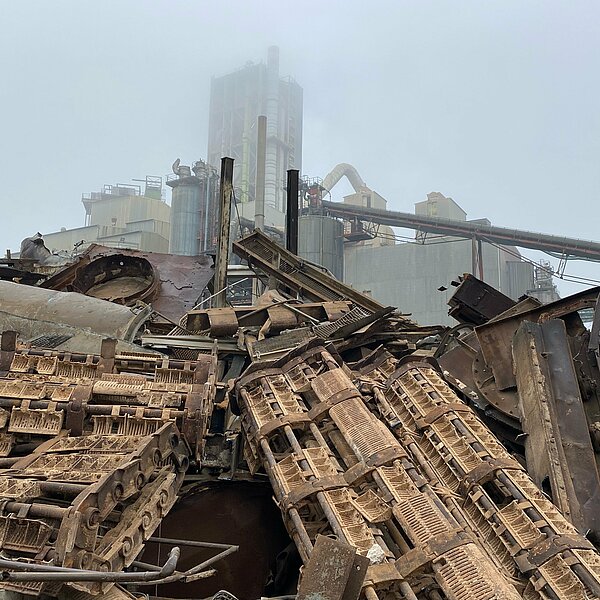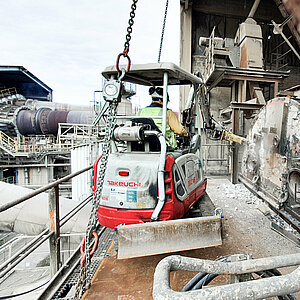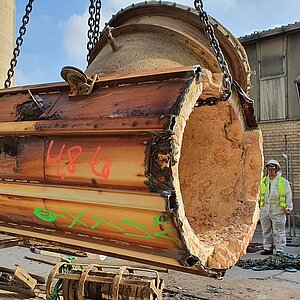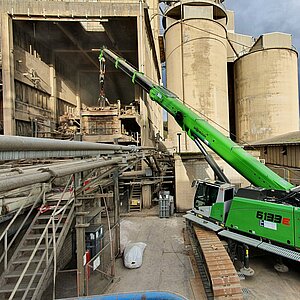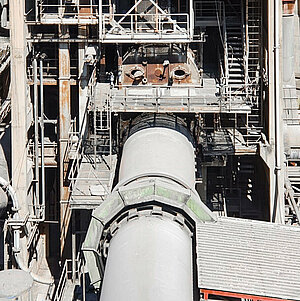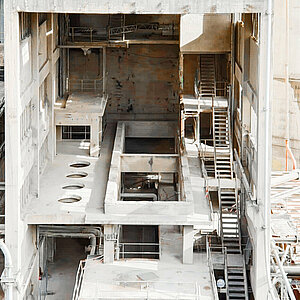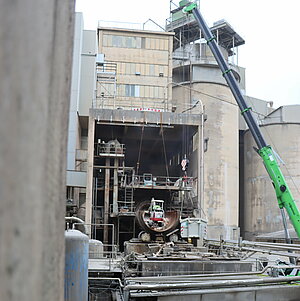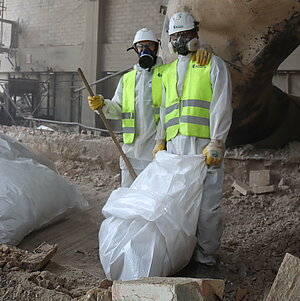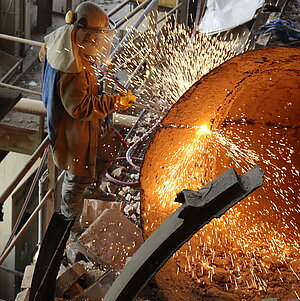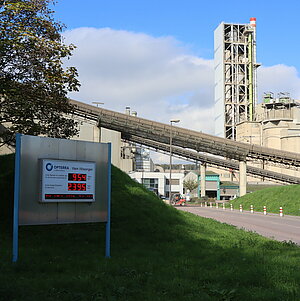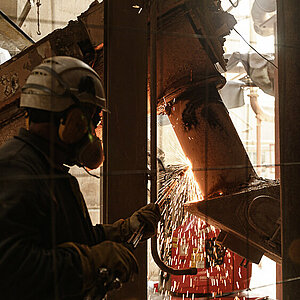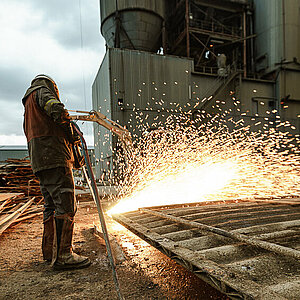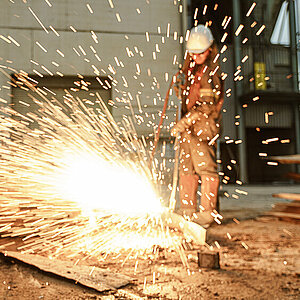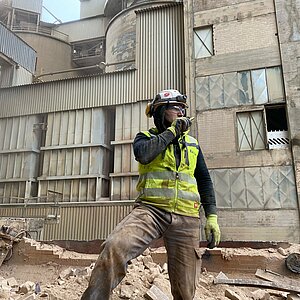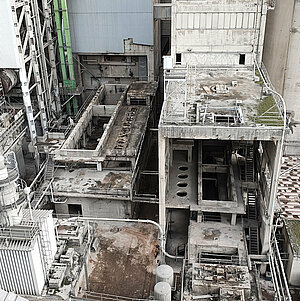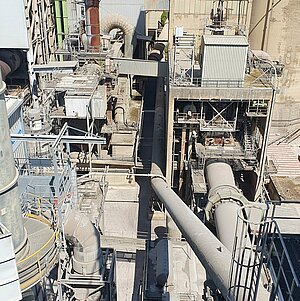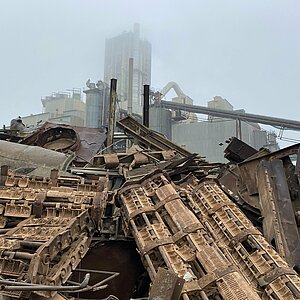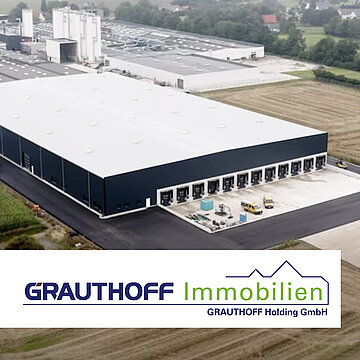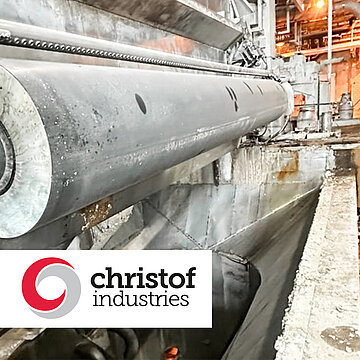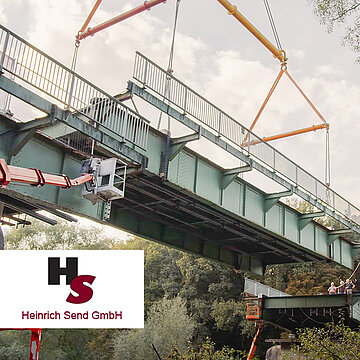Work carried out
- Dismantling of three electric filters
- Dismantling of two chimneys
- Dismantling of a clinker cooler
- Dismantling of two Lepol grates
- Dismantling of various peripherals
Machines in use
- 130 to crawler crane
- Various mobile cranes and lifting platforms of different sizes
- Chain excavator 30 tons
- Handling excavators
- Compact equipment (excavators and wheel loaders) up to 8 tons
Knepper's expertise in the demolition and dismantling of large industrial plants grows with every project. In this complex project in particular, there was a lot of new experience to be gained. The dismantling of a decommissioned furnace plant, some of whose components weighing several tons were lying in the ground, difficult to access and rising up to 30 meters into the air, required all the skills needed to find a solution. The colossus was to be dismantled step by step and as effectively as possible. The whole thing would not be a problem if it were to be completely demolished. Here, however, the building was to remain standing for subsequent use. In addition, cables and pipes for operating systems ran through the building, which could not be damaged under any circumstances. A tough nut to crack, which Knepper did successfully.
In the beginning, Managing Director Carsten Knepper and estimator Max Hohner had to make several on-site appointments. Ideas were discussed and discarded in order to find the most cost-effective solution for the customer and to be able to calculate the project reliably. The advantage for OPTERRA Wössingen GmbH was that the furnace line and the associated technical systems were largely made of steel, which could be recycled. The compensation for the steel scrap reduced the demolition costs - an important factor for OPTERRA. Knepper is very well networked in the scrap trade throughout Germany and has decades of expertise. This made it possible to achieve optimum marketing revenues for the approximately 1,500 tons of steel scrap. Christian Zenner, Investment and Development Manager at OPTERRA and responsible for future technology at the cement plant, explains:
"For the extensive demolition project, we were keen to have a reliable partner that works completely independently, generates the highest revenue for the steel scrap and meets our high safety requirements." The latter was one of the reasons why OPTERRA chose Knepper when awarding the contract. "The safety concept and the fair cooperation convinced us," he continues.
For OPTERRA, speed and costs are the most important factors in addition to safety. In order to make the demolition and dismantling of the furnace line as economical as possible, Knepper got creative when considering the question: What is the quickest way to get the system out? The usual, but also more complicated way would have been to scaffold the plant. The Knepper team saw things differently, because with the right equipment consisting of special machines, the whole thing could be tackled more efficiently. "Our concept was to work our way from top to bottom when dismantling the three electrostatic precipitators and lift the parts out of the building individually and very carefully using a telescopic crane," says site manager Pedro Cano from Knepper.
In order to make room for the mobile crane, systems on the ground were dismantled first. The Knepper team worked harnessed from a specially secured lifting platform to cut the filters and façade elements into pieces. The telescopic crane was used to transport the parts, which weighed up to 10 tons, downwards. Two mobile telescopic cranes were used to dismantle the 60-metre-high chimney - a rare sight. The spectacular work of the Knepper team took place under the watchful eye and supervision of the OPTERRA technical manager, as production at the plant continued. Compliance with the strict safety regulations was therefore paramount. Pedro Cano reports: "After a short time, the people in charge recognized that we were working very cleanly and placed a lot of trust in us."
The dismantling of the cooler, filter and stovepipe mainly resulted in heavy mixed scrap, which was weighed directly on site and cut or burned to Chargier size. Knepper also found marketing channels for the approx. 10 tons of kiln tube rings that could not be shredded on site. Knepper also pays attention to environmentally friendly transportation when marketing and prefers to select scrap trading partners that can be reached directly by water or have their own rail connection. Knepper also took care of the professional disposal of all materials such as insulating materials and oil residues. "We really appreciated the fact that Knepper has various approvals for disposal and that we were able to completely hand over the issue in line with our sustainability strategy. Except for the concrete parts, which we incorporate directly into our production. We have other parts of the plant that need to be dismantled - with Knepper, we can do it again at any time," summarizes project manager Christian Zenner.
Your contact person
SALES DEMOLITION AND DISMANTLING
Phone: +49 2941 2841-310
E-Mail: vertrieb@knepper-gruppe.de
"The safety concept and the fair cooperation convinced us. We have other parts of the plant that need to be dismantled - with Knepper again at any time."
Christian Zenner
Investment and development manager at OPTERRA
"After a short time, those responsible recognized that we work very cleanly and placed a lot of trust in us."
Pedro Cano
Site manager at Knepper
Further references
